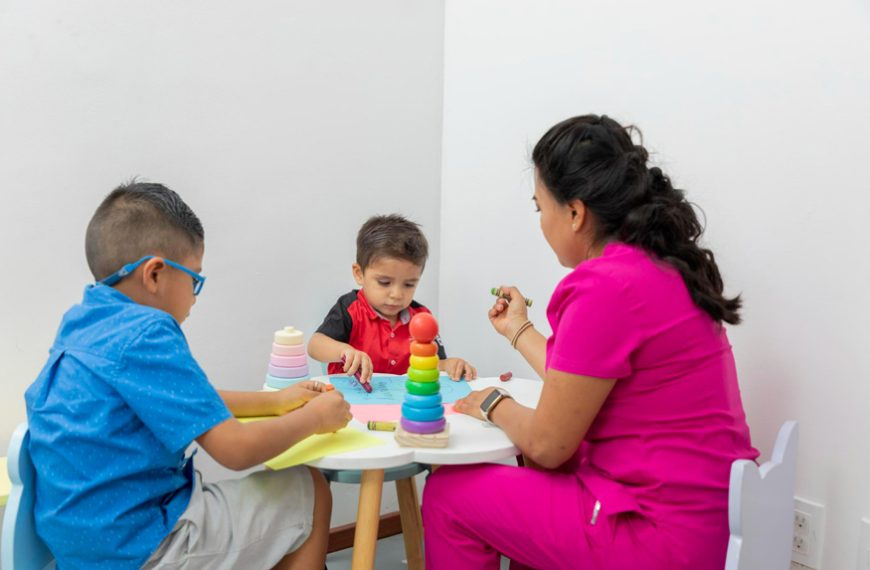Given that more and more families have both parents working and very rarely do they have a larger circle of support, the need and demand for daycare centres has risen sharply. We understand that juggling work and parenting can be tough, and it can be very daunting to leave your little one in a daycare or child care centre. Especially when you don’t have enough information as to what these centres are, how they operate and how they practise child care management.
To help you get started here are a few pointers that explain child care management in the context of daycare centres.
What Is Child Care Management And Is It Practised Only In Daycare Centers?
While different boards and centres govern modern education, especially elementary and higher education, the foundation of early childhood education and development is built on child care management. In the simplest of terms, it’s a large umbrella under which one ensures that they can provide a safe, nurturing and stimulating environment to children where they can learn, thrive and grow.
All early childhood education programs come under the umbrella of child care management. This includes different types of arrangements such as home-based care, nannies or au pairs, pre-schools and daycare centres.
Exploring Daycare Centres: How Do They Operate And Who Manages Them?
In India, childcare centres are generally of three types —
- Government-run,
- NGO-run
- Privately owned.
The government-run centres are operated under the Integrated Child Development Services (ICDS), a programme run by the Ministry of Women and Child Development.
The standards set by this scheme coupled with the guidelines laid down by the National Council for Early Childhood Education (NCECE) also serve as guard rails for private centres, providing them benchmarks for meeting required child care compliance.
Privately owned daycare centres also have to obtain licences from relevant state authorities and municipal corporations after gaining appropriate child care compliance which often takes into consideration factors such as the number of children proposed to be admitted by the centre, its location and size, the qualifications of its staff, proposed curriculum, infrastructure and health and safety measures.
Who Is In Charge Of Running A Child Care Center?
Most childcare centres are run by individuals who are either owners or directors of the organisation. They are often referred to as child care administrators and carry out duties such as creating wait lists and admission lists, recruiting teaching and other staff, finances, and handling logistics & maintenance. Whether it’s an independent entity or a franchisee, a child care administrator is in charge of running the centre.
Educational And Training Requirements Of Child Care Administrator
In India, there are no fixed stipulated qualifications required to become a director/ child care administrator. Given the three types of childcare centres, they may vary. Although, it’s expected that a candidate should have some relevant experience in early education and that they have received higher education in the same field.
At the very least, it is expected that they should have a Diploma in early childhood education while having a bachelor’s degree in the same is looked upon favourably and can be required to run large centres. However, there could be certain state-specific or municipality-specific requirements that may vary from one place to another.
What Are The Important Factors Influencing Child Care Center Management?
While selecting a child care centre for your little one, it may help to think of them less as babysitting spots and more as learning depots where your tiny one takes developmental leaps. There are a few things that are crucial to the management of a childcare centre. We have listed them below to help you understand what goes into making a childcare centre great and what factors you should be looking into:
- Curriculum and Educators:
- Health and safety measures:
- Communication:
- Infrastructure:
- Flexibility and Support:
The kind of early education program and approach to learning a childcare centre has is vital. It may be the reason why your child falls in love with learning and can’t wait to go to the child care centre.
Does it have a traditional model or does it focus on play-based learning? What is the teaching philosophy of its educators? All of this should be something you look into when searching for a prospective daycare centre for your little one.
Safety first! Especially for your tiny tots who may still lack the knowledge of self-preservation. Fire safety drills, compliance with local safety laws, hygiene protocols and emergency preparedness plans — all of this should be taken into account.
This is a big one. Given how much time your child is going to spend in the centre all progress and major updates about them must be conveyed to you. This can keep you informed and help you iron out any issues or concerns that may be spotted by the teachers at the centre.
Is the space well-lit and clean? Are the toys stimulating and non-toxic? Does the area have enough open space? A well-functioning place should meet these criteria.
It’s also important to note if the child care centre offers extended support for kids who need it, be it transport or special needs support such as speech therapy. Apart from that you also need to weigh in if they offer any flexibility such as part-time hours, extended drop-off or pick-up timings. Though not a must-have, facilities such as this can make it much easier for both the parents as well as the children.
Choosing a child care centre is a huge decision that can have a far-reaching impact on your child’s well-being and your parenting journey. With knowledge about child care management, administration of child care centres and childcare centre management, you are equipped to make the best decision for yourself and your child. Remember, the key is to seek a safe, nurturing, positive space for your child that practises open communication and has qualified educators and administrators.
If you have other concerns about early childcare management or want to explore safe and nurturing learning spaces for your child, you can visit the EuroKids Blog. You can also schedule a visit to your nearest EuroKids branch to understand the best practices in childcare management.















